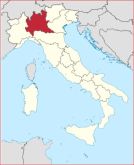April 26, 2020. “Many failures combined to unleash death on Italy’s Lombardy,“ AP, Nicole Winfield, Rome
 “As Italy prepares to emerge from the West’s first and most extensive coronavirus lockdown, it is increasingly clear that something went terribly wrong in Lombardy, the hardest-hit region in Europe’s hardest-hit country.
“As Italy prepares to emerge from the West’s first and most extensive coronavirus lockdown, it is increasingly clear that something went terribly wrong in Lombardy, the hardest-hit region in Europe’s hardest-hit country. Italy had the bad luck of being the first Western nation to be slammed by the outbreak, and its official total of 26,600 fatalities lags behind only the U.S. in the global death toll. Italy’s first homegrown case was recorded Feb. 21, at a time when the World Health Organization was still insisting the virus was “containable” and not nearly as infectious as the flu.
But there is also evidence that demographics and health care deficiencies collided with political and business interests to expose the 10 million people in the northern Italian region of Lombardy to COVID-19 in ways unseen anywhere else, particularly the most vulnerable in nursing homes….
NURSING HOME ‘MASSACRE’
While the regional government was focused on building the field hospital and scrambling to find ICU beds, its testing capacity lagged and Lombardy’s nursing homes were in many ways left to fend for themselves.
Hundreds of elderly have died in Lombardy and across Italy in what one WHO official has termed a “massacre” of those most vulnerable to the virus.…
Lombardy has more nursing homes than any other region, housing at least 24,000 elderly, and
it registered more dead at those facilities than others too. Of the
3,045 dead from Feb. 1 to April 15 in the region, 1,625 were either
positive for the virus or showed its symptoms, according to preliminary
results from a survey by the Superior Institute of Health.
Of particular attention to prosecutors was the March 8 decision by the regional government to allow recovering COVID-19 patients to be put in nursing homes [which are not hospitals] to free up hospital beds.The region says it required the homes guarantee the patients would be isolated, but it’s not clear who was responsible to ensure that or whether anyone checked.
A March 30 regional decree,again aimed at easing pressure on Lombardy’s ICUs, told nursing home directors to not hospitalize sick residents over 75 if they had other health problems. The decree said it was “opportune to treat them in the same facility to avoid further risks of decline in transport or during the wait in the emergency room.”
For the elderly at a nursing home in Nembro, one of the hardest-hit towns in Bergamo province, the decree amounted to a death warrant. But it wasn’t the first or only one that gave the [nursing] home’s managers the sense that they were being abandoned.
When management proactively barred visitors on Feb. 24 to try to protect residents and staff from infection, local health authorities responded by threatening sanctions and a loss of accreditation for cutting off family visits, said the facility’s new director, Valerio Poloni.
In the end, 37 of the 87 residents died in February and March.
Its doctor, as well as Poloni’s predecessor as director, also tested
positive, were hospitalized and died. A nursing home resident couldn’t get admitted to the hospital in late February because the ER was too crowded.
The facility’s health director, Barbara Codalli, said she was told to use her existing resources to treat the sick. “The patient returned a few hours later, and a few days later the patient died,” she told La7 television.
To date, none of the surviving residents has been tested. Poloni said tests were expected to begin in a few days. Two more residents died so far in April, but the situation seems under control….
A COSTLY FIELD HOSPITAL
Perhaps no initiative better illustrates Italy’s confused coronavirus response than the 200-bed field hospital built in less than two weeks on the grounds of Milan’s convention center.
The hospital was unveiled to great fanfare on March 31, the fruit of a 21 million euro ($23 million) fundraising campaign headed by Lombardy’s governor, a member of the right-wing League party, to try to ease pressure on regional ICUs, which on that date were near capacity at 1,324 patients….
In the end, the Milan field hospital was barely used, treating only a few dozen patients. Since it opened, Lombardy has seen pressure on its ICUs fall considerably, with just 700 people needing intensive care today.
Fontana, the
governor, defended the decision and said he would do it again, telling
Radio 24: “We had to … prepare a dam in case the epidemic overcame the
embankment.””…
___
................

No comments:
Post a Comment